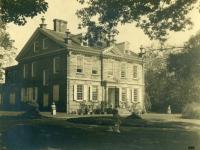
What is that which goes from Boston to New York without moving?

What word is it that which, divided into three, expresses a partnership, a religious lady, and a noisy musical instrument?
Any chance you know the answer to these conundrums? They are two of dozens of riddles and conundrums found in the collections at Cliveden – and they don’t come with an answer key!
These riddles are a part of the archival collections at Cliveden of the National Trust, a historic site and house museum located in the Germantown section of Philadelphia, Pa. Cliveden, a stone mansion in the Georgian style with manicured gardens, elaborate woodwork, and imported furnishings, was originally built by Benjamin Chew in 1767 as a summer retreat for his family. Chew, the son of Maryland Quakers, was one of the most highly-trained lawyers in the Colonies at the time, having served as principal legal advisor for the Penn family and also held the appointment of Chief Justice of the Supreme Court of the Province of Pennsylvania prior to the beginning of the Revolutionary War.

Cliveden
Although a pacifist, Chew sided with the British. Placed under house arrest in New Jersey with his family, Chew was not present in 1777 when Cliveden and the surrounding area served as the staging ground for the Battle of Germantown. British troops occupied Cliveden, eventually repelling General George Washington’s troops.
Following the Revolutionary War, Chew was able to reestablish himself in Philadelphia due to his personal connections. He was then able to repurchase and restore Cliveden for his family. Generations of Chews continued to reside at Cliveden until 1972, when they donated the house and its contents to the National Trust for Historic Preservation.
Today, Cliveden of the National Trust is open to the public for tours and regularly hosts programs such as concerts, lectures, and plays. The Battle of Germantown is annually reenacted on the site as well. Cliveden oversees Upsala, a historic house in the Federalist style located across the street.

Upsala
In addition to riddles, the collections at Cliveden include records documenting the administration of Cliveden and Upsala, as well as original documents from the Johnson family, original owners of Upsala. The Chew family papers are not located at Cliveden, but at the Historical Society of Pennsylvania.
If you’re interested in learning more about Cliveden, the Chew family, and the Battle of Germantown, take a trip to Germantown for a tour!
In the meantime, here are a few more riddles to keep you busy.

If a man’s horse has lost his tail, why would he sell him wholesale?

How many sides are there to a tree?

What word is that which, when a letter is taken from it, makes you sick?

